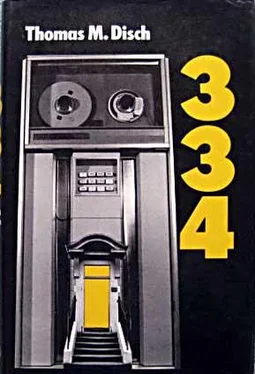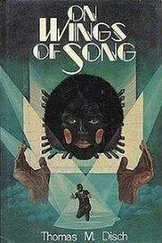The Hansons, Boz and Milly, had been happily unhappily married for a year and a half. Boz was twenty-one and Milly was twenty-six. They had grown up in the same MODICUM building at opposite ends of a long, glazed, green-tile corridor, but because of the age difference they never really noticed each other until just three years ago. Once they did notice each other though, it was love at first sight, for they were, Boz as much as Milly, of the type that can be, even at a glance, ravishing: flesh molded with that ideal classic plumpness and tinged with those porcelain pink pastels we can admire in the divine Guido, which, at least, they admired; eyes hazel, flecked with gold; auburn hair that falls with a slight curl to the round shoulders; and the habit, acquired by each of them so young that it could almost be called natural, of striking poses eloquently superfluous, as when, sitting down to dinner, Boz would throw his head back suddenly, flip flop of auburn, his ripe lips slightly parted, like a saint (Guido again) in ecstasy—Theresa, Francis, Ganymede—or like, which was almost the same thing, a singer, singing
I am you
and you are me
and we are just two
sides
of the same coin.
Three years and Boz was still as hung up on Milly as he had been on the first morning (it was March but it had seemed more like April or May) they’d had sex, and if that wasn’t love then Boz didn’t know what love meant.
Of course it wasn’t just sex, because sex didn’t mean that much to Milly, as it was part of her regular work. They also had a very intense spiritual relationship. Boz was basically a spiritual type person. On the Skinner-Waxman C-P profile he had scored way at the top of the scale by thinking of one hundred and thirty-one different ways to use a brick in ten minutes. Milly, though not as creative as Boz according to the Skinner-Waxman, was every bit as smart in terms of IQ (Milly, 136; Boz, 134), and she also had leadership potential, while Boz was content to be a follower as long as things went more or less his own way. Brain surgery aside, they could not have been more compatible, and all of their friends agreed (or they had until very recently ) that Boz and Milly, Milly and Boz, made a perfect couple.
So what was it then? Was it jealousy? Boz didn’t think it was jealousy but you can never be sure. He might be jealous unconsciously. But you can’t be jealous just because someone was having sex, if that was only a mechanical act and there was no love involved. That would be about as reasonable as getting uptight because Milly talked to someone else. Anyhow he had had sex with other people and it never bothered Milly. No, it wasn’t sex, it was something psychological, which meant it could be almost anything at all. Every day Boz got more and more depressed trying to analyze it all out. Sometimes he thought of suicide. He bought a razor blade and hid it in The Naked and the Dead. He grew a moustache. He shaved off the moustache and had his hair cut short. He let his hair grow long again. It was September and then it was March. Milly said she really did want a divorce, it wasn’t working out and she could not stand him nagging at her any more.
Him nagging at her?
“Yes, morning and night, nag, nag, nag.”
“But you’re never even home in the morning, and you’re usually not home at night.”
“There, you’re doing it again! You’re nagging now. And when you don’t come right out and nag openly, you do it silently. You’ve been nagging me ever since dinner without saying a word.”
“I’ve been reading a book.” He wagged the book at her accusingly. “I wasn’t even thinking about you. Unless I nag you just by existing.” He had meant this to sound pathetic.
“You can, you do.”
They were both too pooped and tired to make it a really fun argument, and so just to keep it interesting they had to keep raising the stakes. It ended with Milly screaming and Boz in tears and Boz packing his things into a cupboard which he took in a taxi to East 11th Street. His mother was delighted to see him. She had been fighting with Lottie and expected Boz to take her side. Boz was given his old bed in the living room and Amparo had to sleep with her mother. The air was full of smoke from Mrs. Hanson’s cigarettes and Boz felt more and more sick. It was all he could do to keep from phoning Milly. Shrimp didn’t come home and Lottie was zonked out as usual on Oraline. It was not a life for human beings.
The Sacred Heart, gold beard, pink cheeks, blue blue eyes, gazed intently across twelve feet of living space and out the window unit at long recessions of yellow brick. Beside him a Conservation Corporation calendar blinked now BEFORE and then AFTER views of the Grand Canyon. Boz turned over so as not to have to look at Jesus, the Grand Canyon, Jesus. The tuckaway lurched to port side. Mrs. Hanson had been thinking of having someone in to fix the sofa (the missing leg led an independent existence in the cabinet below the sink) ever since the Welfare people had busted it on the day how many years ago that the Hansons had moved in to 334. She would discuss with her family, or with the nice Mrs. Miller from the MOD office, the obstacles in the way of this undertaking, which proved upon examination so ramiform and finally so formidable as very nearly to defeat her most energetic hopes. Nevertheless, some day.
Her nephew, Lottie’s youngest, was watching the war on the teevee. It was unusual for Boz to sleep so late. U.S. guerillas were burning down a fishing village somewhere. The camera followed the path of the flames along the string of fishing boats, then held for a long time on the empty blue of the water.
Then a slow zoom back that took in all the boats together. The horizon warped and flickered through a haze of flame. Gorgeous. Was it a rerun? Boz seemed to think he’d seen that last shot before.
“Hi there, Mickey.”
“Hi, Uncle Boz. Grandma says you’re getting divorced. Are you going to live with us again?”
“Your grandma needs a decongestant. I’m only here for a few days. On a visit.”
The apple pie colophon, signaling the end of the war for that Wednesday morning, splattered and the decibels were boosted for the April Ford commercial, “Come and Get Me, Cop.”
Come and get me, Cop,
Cause I’m not gonna stop
At your red light.
It was a happy little song, but how could he feel happy when he knew that Milly was probably watching it too and enjoying it in a faculty lounge somewhere, never even giving a thought for Boz, or where he was, or how he felt. Milly studied all the commercials and could play them back to you verbatim, every tremor and inflection just so. And not a milligram of her own punch. Creative? As a parrot.
Now, what if he were to tell her that? What if he told her that she would never be anything more than a second-string Grade-Z hygiene demonstrator for the Board of Education. Cruel? Boz was supposed to be cruel?
He shook his head, flip flop of auburn. “Baby, you don’t know what cruel is.”
Mickey switched off the teevee. “Oh, if you think this was something today you should have seen them yesterday. They were in this school. Parkistanis, I think. Yeah. You should have seen it. That was cruel. They wiped them out.”
“Who did?”
“Company A.” Mickey came to attention and saluted the air. Kids his age (six) always wanted to be guerillas or firemen. At ten it was pop singers. At fourteen, if they were bright (and somehow all the Hansons were bright), they wanted to write. Boz still had a whole scrapbook of the advertisements he’d written in high school. And then, at twenty …?
Читать дальше












